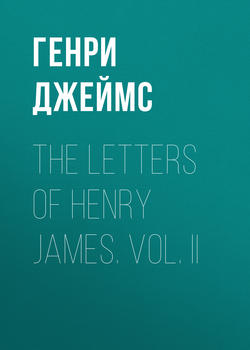Читать книгу The Letters of Henry James. Vol. II - Генри Джеймс, Henry Foss James - Страница 52
VI
Rye (continued)
(1904-1909)
To W.E. Norris
ОглавлениеLamb House, Rye.
December 23rd, 1908.
My dear Norris,
I have immensely rejoiced to hear from you to-night, though I swear on my honour that that has nothing to do with this inveterate—isn't it?—and essentially pious pleasure, belonging to the date, of making you myself a sign. I have had the sad sense, for too long past, of being horrid, however (of never having acknowledged—at the psychological moment—your beautiful and interesting last;) and it has been for me as if I should get no more than my deserts were you to refuse altogether any more commerce with me. Your noble magnanimity lifting that shadow from my spirit, I perform this friendly function now, with a lighter heart and a restored confidence. Being horrid (in those ways,) none the less, seems to announce itself as my final doom and settled attitude: I grow horrider and horrider (as a correspondent) as I grow more aged and more obese, without at the same time finding that my social air clears itself as completely as those vices or disfigurements would seem properly to guarantee. Most of my friends and relatives are dead, and a due proportion of the others seem to be dying; in spite of which my daily prospect, these many months past, has bristled almost overwhelmingly with People, and to People more or less on the spot, or just off it, in motors (and preparing to be more than ever on it again,) or, most of all haling me up to town for feverish and expensive dashes, in the name of damnable and more than questionable duties, interests, profits and pleasures—to such unaccountable and irrepressible hordes, I say, I keep having to sacrifice heavily. The world, to my great inconvenience—that is the London aggregation of it—insists on treating me as suburban—which gives me thus the complication without my having any of the corresponding ease (if ease there be) of the state; and appalling is the immense incitement to that sort of invasion or expectation that the universal motor-use (hereabouts) compels one to reckon with. But this is a profitless groan—drawn from me by a particularly ravaged summer and autumn, as it happens—and at a season of existence and in general conditions in which one had fixed one's confidence on precious simplifications. A house and a little garden and a little possible hospitality, in a little supposedly picturesque place 60 miles from London are, in short, stiff final facts that (in our more and more awful age) utterly decline to be simplified—and here I sit in the midst of them and exhale to you (to you almost only!) my helpless plaint. Fortunately, for the moment, I take the worst to be over. I've a young—a very young—American nephew who has come to me from his Oxford tutor to spend Xmas, and I have, in order to amuse him, engaged to go with him to-morrow and remain till Saturday with some friends six miles hence; but after that I cling to the vision of a great stretch of undevastated time here till April, or better still May, when I may go up to town for a month. Absorbing occupations—the only ones I really care for—await me in abysmal arrears—but I spare you my further overflow.
It has kept me really all this time from saying to you what I had infinitely more on my mind—how my sense of your Torquay life, with all that violent sadness, that great gust of extinction, breathed upon it, has kept you before me as a subject of much affectionate speculation. Of course you've picked up your life after a fashion; but we never pick up all—too much of it lies there broken and ended. But I seem to see you going on, as you're so gallantly capable of doing, in the manner of one for whom nothing more has happened than you were naturally prepared for in a world that you decently abstain from characterizing—and I congratulate you again on your mastery of the art of life—of the Torquay variety of it in particular. (We have to decide on the kind we will master—but I haven't mastered this kind!) I at any rate saw Gosse in town some three weeks ago, and he spoke of having seen you not long previous and of the excellent figure you made to him. (I didn't know you were there—but indeed a certain turmoil about me here—speaking as a man loving his own hours and his own company—must have been then, I think, at its thickest.) … I hope something or other pleasant has brushed you with its wing—and even that you've been able to put forth a quick hand and seize it. If so, keep tight hold of it—nurse it in your bosom—for 1909—and believe me, my dear Norris, yours always and ever,
HENRY JAMES.
